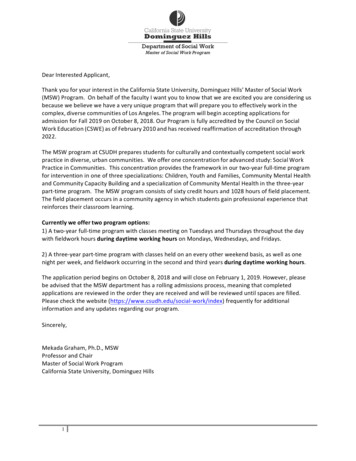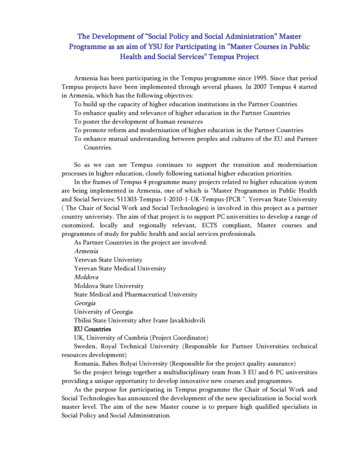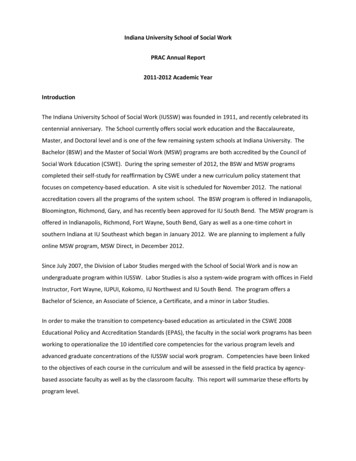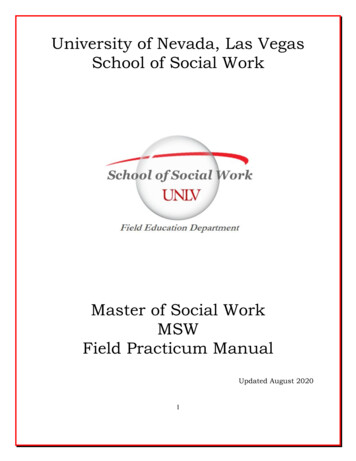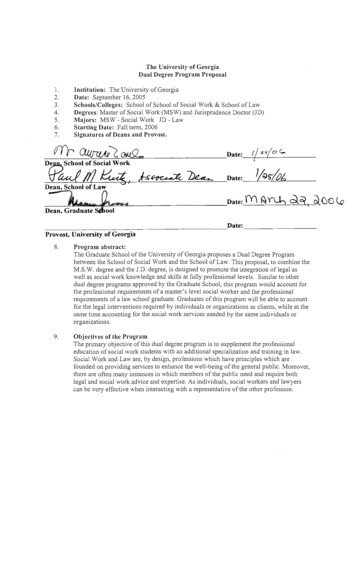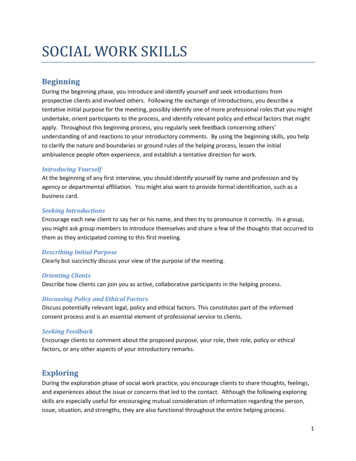
Transcription
SOCIAL WORK SKILLSBeginningDuring the beginning phase, you introduce and identify yourself and seek introductions fromprospective clients and involved others. Following the exchange of introductions, you describe atentative initial purpose for the meeting, possibly identify one of more professional roles that you mightundertake, orient participants to the process, and identify relevant policy and ethical factors that mightapply. Throughout this beginning process, you regularly seek feedback concerning others’understanding of and reactions to your introductory comments. By using the beginning skills, you helpto clarify the nature and boundaries or ground rules of the helping process, lessen the initialambivalence people often experience, and establish a tentative direction for work.Introducing YourselfAt the beginning of any first interview, you should identify yourself by name and profession and byagency or departmental affiliation. You might also want to provide formal identification, such as abusiness card.Seeking IntroductionsEncourage each new client to say her or his name, and then try to pronounce it correctly. In a group,you might ask group members to introduce themselves and share a few of the thoughts that occurred tothem as they anticipated coming to this first meeting.Describing Initial PurposeClearly but succinctly discuss your view of the purpose of the meeting.Orienting ClientsDescribe how clients can join you as active, collaborative participants in the helping process.Discussing Policy and Ethical FactorsDiscuss potentially relevant legal, policy and ethical factors. This constitutes part of the informedconsent process and is an essential element of professional service to clients.Seeking FeedbackEncourage clients to comment about the proposed purpose, your role, their role, policy or ethicalfactors, or any other aspects of your introductory remarks.ExploringDuring the exploration phase of social work practice, you encourage clients to share thoughts, feelings,and experiences about the issue or concerns that led to the contact. Although the following exploringskills are especially useful for encouraging mutual consideration of information regarding the person,issue, situation, and strengths, they are also functional throughout the entire helping process.1
Asking QuestionsSeek information about the concerns that led to this encounter. Questions serve to elicit facts, ideas,and feelings concerning the person, the issue, the situation, and potential means for resolution. Theyoften yield information necessary for mutual understanding, assessment, decision making, planning,working and evaluating, and ending.Closed-ended questions: Phrased to elicit short responses, sometimes simply yes or no. Closed-endedquestions yield a great deal of information in a brief amount of time.Open-ended questions: Encourages people to express themselves expansively and extensively. Theytend to further exploration on a deeper level or in a broader way.Seeking ClarificationAsk the client to elaborate about something he or she has just said or done. This generates morecomplete and comprehensible information about particular aspects of the person-issue-situation.Reflecting ContentCommunicate your understanding of the factual or informational part of a message, by paraphrasing orrestating the client’s words.Reflecting FeelingsA brief response that communicates your understanding of the feelings expressed by a client.Reflecting Feeling and MeaningParaphrase or mirror clients’ emotions along with the facts or beliefs associated with them.PartializingHelp clients break down multiple or complex aspects and dimensions of the person-issue-situation intomore manageable units so you can address them more easily.Going BeyondTake a small leap beyond the expressed message to bring into greater awareness or clarity informationthat a client already knows.AssessingDuring the assessment phase of social work practice, you and the client attempt to make sense of thedata gathered during the exploration phase. The assessment gives the parties involved a perspectivefrom which to initiate the process of contracting. Two skills are especially pertinent to the assessmentphase: (1) organizing information and (2) preparing a tentative assessment and case formulation.Organizing Descriptive InformationThis involves arranging data according to certain categories that you and agency professionals considersignificant. Be sure to distinguish clearly between reported and observed information.2
Preparing a Tentative Assessment and Case FormulationAfter recording the available information in an organized fashion, you – with the active participation ofthe client – begin to prepare a tentative assessment and case formulation. You do so through analysisand synthesis, the primary critical thinking skills involved in this process. Analysis involves examining infine detail various pieces of information about the client system, issues, and circumstances. In synthesis,you take certain bits of data or certain aspects of the analysis and combine them into a coherent whole.ContractingBased on the assessment an in conjunction with the client, during the contracting phase of social workpractice you attempt to define clearly the issues and goals for work and develop plans likely to resolvethe identified issues and achieve the final goals.Reflecting an IssueYou demonstrate to clients that you understand their view of an identified topic of concern.Reflecting HypothesesWhen you empathically and accurately communicate your understanding of clients’ explanatoryhypotheses.Identifying an IssueYou may identify an issue that the client did not mention during the exploration process. Based on theemerging assessment of the person-issue-situation, you may recognize an area of concern that relatedto the presenting problem but was not noticed or not acknowledged by the client.Clarifying Issues for WorkTypically, you use the skills of reflecting and identifying issues before you and clients jointly agree on thespecific problems or issues to address. When you clarify issues, you make a commitment that your worktogether will focus primarily on these particular areas.Establishing GoalsFollowing clarification of problems or issues, encourage clients to participate in establishing goalsdesigned to address and resolve them. Goals should be specific, measurable, action oriented, realisticand timely.Developing an Action PlanSometimes called “service plans,” “treatment plans,” or “intervention plans,” action plans address thequestions of who, what, where, when, and especially how you and the client will pursue the agreedupon goals.Identifying Action StepsWhen it is unrealistic and impractical to undertake simultaneously all the actions needed to accomplisha particular goal, engage the client in identifying small action steps or tasks that are consistent with theaction plan and likely to contribute to goal accomplishment.3
Planning for EvaluationIdentify some means to measure progress towards goal attainment.Summarizing the ContractInvolves a concise review of the essential elements of the service agreement that you and the clientapproved. The service contract covers issues for work, goals, an action plan, tasks or action steps, andthe means by which you and the client intend to evaluate progress.Working and EvaluatingDuring the work and evaluation phase of social work practice, you and the client take action towardresolving the identified issues and achieving the established goals. In this process, you use bothempathic skills and work phase expressive skills.Rehearsing Action StepsPrepare and encourage clients to carry out agreed-upon tasks. Identify and confront those bio-psychosocial or environmental obstacles that interfere with task accomplishment. Various rehearsal in-sessionactivities such as role play, guided practice, and visualization constitute action step practice.Reviewing Action StepsHelp to increase the probability that further action steps will be attempted when you demonstrate yourinterest in the process and outcome of their action steps by asking about them. By reviewing whathappened following the attempt, you also gather information that contributes to the evaluation ofprogress toward goal achievement and the identification of subsequent action steps.EvaluatingEvaluation often occurs while you are reviewing action steps. You and the client may identify progressthrough changes in such indicators as goal attainment scales, frequency counts, individualized orsubjective rating scales, rapid assessment instruments, or other paper-and-pencil and onlineinstruments. You engage clients in examining data in accordance with the plans for evaluating progress.You determine whether the evaluation data reflect progress toward goal attainment, no change, or achange in the wrong direction.FocusingDirect or maintain attention to the work at hand.EducatingIt may become apparent that clients lack useful or valid information or skills that could contribute to theachievement of the agreed-upon goals for work. Often you share knowledge and hypotheses. Conveythe information in such a way that clients may freely consider its relevance for their particular situationand decide whether to accept it.4
AdvisingMaking a suggestion or recommendation. You should almost always convey that the client may freelyaccept or reject your advice.RepresentingIncludes those actions you take on behalf of clients in pursuit of agreed-upon goals. Instead of workingdirectly with the client, you intervene with others on behalf of the client.Responding with ImmediacyYou focus on clients’ experience of what occurs here and now between you. These thoughts andfeelings become the subject for immediate exploration. Responding with immediacy makes things real.ReframingInvolves sharing a different perspective from that which clients had previously adopted.ConfrontingYou point out to clients – directly and without disapproval – discrepancies, inconsistencies, orcontradictions in their words, feelings, and actions. You challenge clients to examine themselves forcongruence.Pointing out EndingsYou remind the client that the working relationship will come to a close. Periodically during the workphase, you refer to this time frame.Recording ProgressYou must keep records throughout all phases of practice, such as revisions to the initial assessment andcontract, action steps and progress toward goal achievement, results of evaluation procedures etc.EndingThe ending phase of social work practice provides an opportunity for you and your clients to look backon your relationship and the work you undertook together. You have a chance to evaluate overallprogress and to identify directions for future work. However, concluding these working relationshipscan be both a joyful and a painful experience for you and your clients. Each of you may experiencesatisfaction concerning the progress achieved, regret about actions that were not taken, and sadness atthe departure of a person who has been important. In optimal circumstances, you can explore thesefeelings as part of the ending process.Reviewing the ProcessInvolves a summary retrospection of what has occurred between you and your clients during the timeyou have worked together.Final EvaluatingEngage clients in a final evaluation of progress toward issue resolution and goal attainment.5
Sharing Ending Feelings and Saying GoodbyeBecause ending is a significant event in the lives of most clients, you should give them an opportunity toexpress feelings related to the ending process. Like clients, you will probably experience some kind ofemotional reaction during the ending phase. It is often useful to share some of these feelings, whileretaining, however, your professional responsibilities.Recording the Closing SummaryFollowing your final meeting with a client, you condense what occurred into a written closing summary.Taken from Barry Cournoyer’s The Social Work Skills Workbook6
During the work and evaluation phase of social work practice, you and the client take action toward resolving the identified issues and achieving the established goals. In this process, you use both empathic skills and work phase expressive skills. Rehearsing Action Steps Prepare and encourage clients to carry out agreed-upon tasks. Identify and confront those bio-psycho-
